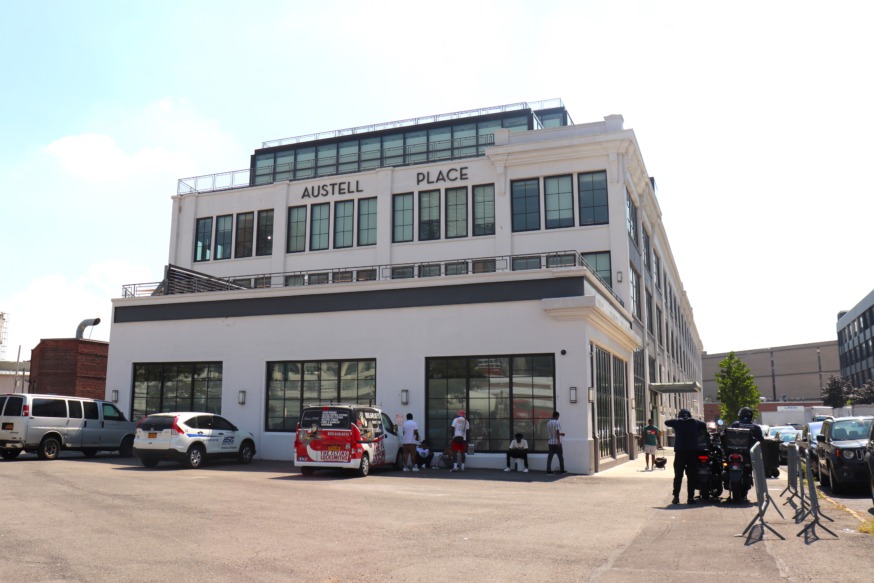
Economic Migrant shelter at 47-11 Austell Pl. in the Long Island City section of Queens (Photo by Michael Dorgan)
Sept. 12, 2023 By Michael Dorgan
Hundreds of economic migrant men have started moving into a new mega shelter in Long Island City and some of them say they have nothing to do all day but wait for work permits to be approved, while some residents have raised safety concerns about the facility opening.
Around 330 migrant men are now housed at the new shelter at 47-11 Austell Pl. — a former high-end office building that recently underwent a multi-million-dollar makeover, which included adding two new floors — with plans in place to house and feed another 770 migrant men at the facility when it reaches full capacity.
The migrants began moving into the building last month although news of the shelter opening only came to light when Mayor Eric Adams announced the move on Wednesday, Sept. 6, as part of his administration’s efforts to cater to around 60,000 undocumented migrants currently in the city’s care. Around 32% of the migrants are located in Queens, with Manhattan housing 42%, according to a spokesperson for the mayor’s office.
The Queens/LIC Post spoke to some of the migrants outside the facility, who said they traveled from countries such as Mauritania, Senegal and the Congo in Africa, as well as from Venezuela in South America, before ending up in New York.
They were in good spirits and willing to talk, although many of spoke had little or no English.
Some of the men were hanging out at the front of the building, while others were sitting on a sidewalk and attempting to sell sneakers to passers-by. Others were repairing one of the dozens of motorized mopeds parked outside the premises’ main entrance.
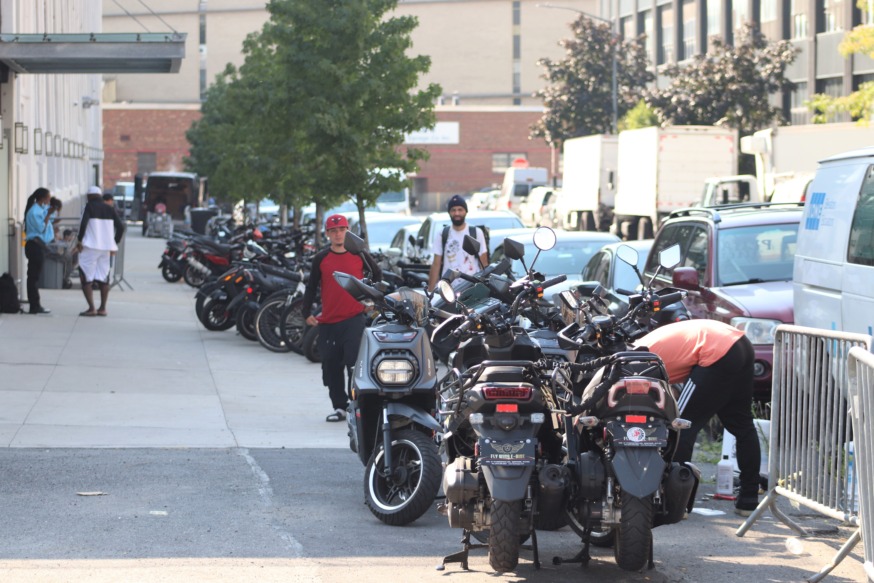
Economic Migrant shelter at 47-11 Austell Pl. in the Long Island City section of Queens (Photo by Michael Dorgan)
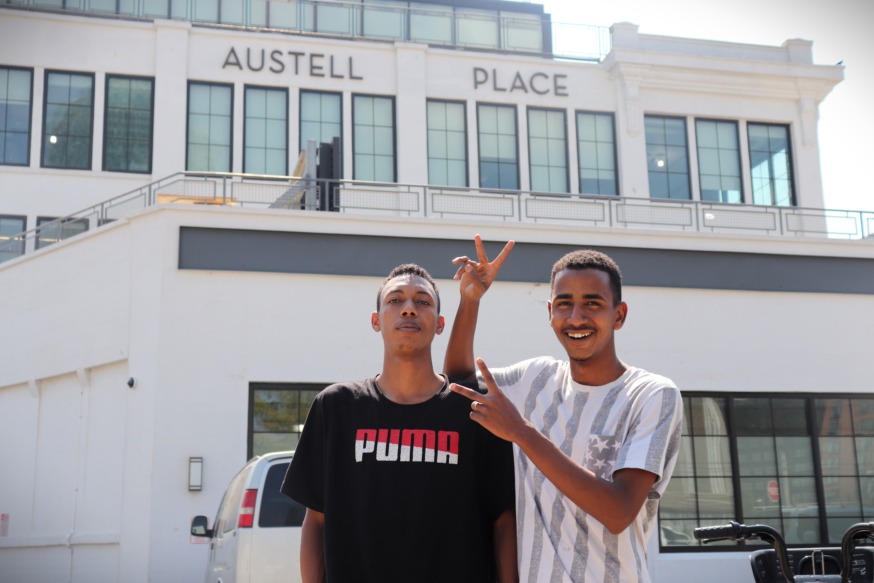
Two economic migrants staying at 47-11 Austell Pl., a new mega shelter in the Long Island City section of Queens (Photo by Michael Dorgan)
The migrants who spoke to the Queens/LIC Post said they have been in New York for the last two months and some of them previously stayed at the Roosevelt Hotel in Manhattan or at another facility in Queens.
The men were in a friendly and jovial mood, although they were frustrated by their inability to get work.
Undocumented migrants must wait at least six months before they can apply for work permits under federal law. A group of New York City lawmakers — including Senate Majority Leader Chuck Schumer and House Democratic Leader Hakeem Jeffries — have written to President Biden urging him to expedite work authorizations for such migrants.
“It’s good bro,” said Boubcrin el-Hakim, 25, a migrant from Mauritania. “I speak Arabic and French and a little bit of English.”
El-Hakim said his journey consisted of him traveling to Turkey and then flying to Colombia and then through countries such as Nicaragua and El Salvador before reaching Mexico and then crossing the US border. He said he previously stayed at another shelter in Queens before moving to the Austell Place shelter.
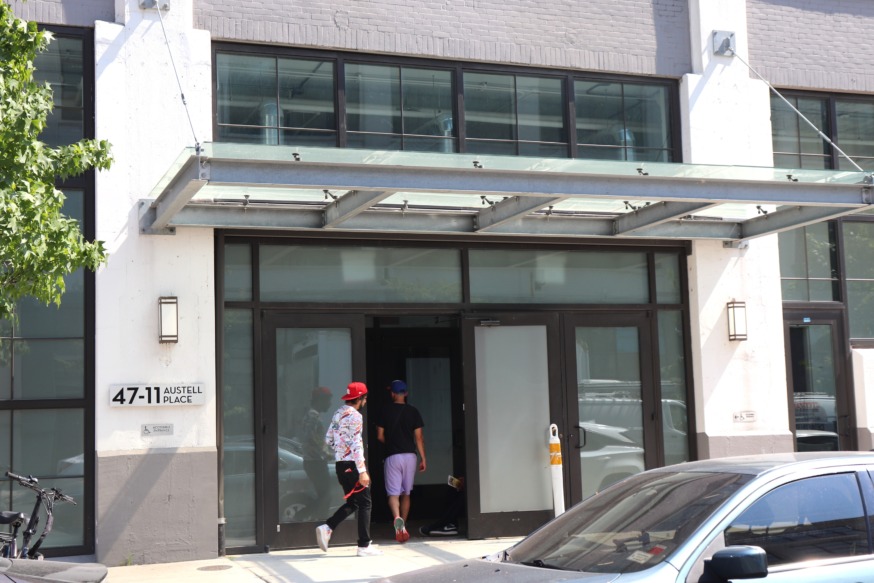
Economic Migrant shelter at 47-11 Austell Place in the Long Island City section of Queens (Photo by Michael Dorgan)
He said he paid an agency in Africa to help him make the journey, but now he is broke and unable to work as he has no work authorization. He did not say what agency helped him.
“Now I don’t have work, I don’t have money, I don’t have anything,” he said.
El-Hakim said the city is not providing him with any help to find a job or to learn new skills such as improving his English.
He said he was unable to find work in Mauritania and that it is dangerous there, so he came to America for a better life.
Saderelo Moussi, 60, who said he worked as a civil engineer in Mauritania, said there are lots of problems between races in the country. He said that racism is a major barrier in securing work.
“The Black man, we have no chance in Mauritania,” said Moussi, adding that he is seeking employment in New York now. “I have no job. I look for job, but it is very difficult to have [a] job here because if you have no paper, you can’t get [a] job. Now I look for any job, any job I can do it.”
Moussi said his wife and two adult children still live in Mauritania. He said plans on applying for asylum here in the future.
He previously stayed at the Roosevelt Hotel in Manhattan before moving to the Austell Place shelter, which is located in an industrial area of Long Island City. There is a well-known ballet center called the Joffrey Ballet School located directly across the street from the shelter, while P.S. Q004 Middle School is about 1,000 feet away. It faces several rail tracks.
47-11 Austell Pl. was originally built in 1916 as a three-story building, but recently underwent an extensive makeover, which included adding two floors with wraparound glass ceilings.
The renovation was touted as “a significant milestone in the Long Island City neighborhood revitalization,” by Kimmerle Group and Kimmerle Newman Architects, a Connecticut-based architectural firm responsible for designing the upgrades.
“47-11 Austell Pl. features high ceilings, an addition of two new, all-glass floors with 14-foot clear glass curtain wall, outdoor terraces at four levels, over-sized industrial windows and exceptional views of the Manhattan skyline,” an undated press release from the firm in reads.
The 171,000-square-foot building was previously occupied by Mitchell’s NY, a family-owned publication delivery business that delivered publications such as the New York Times, the Wall Street Journal and The Real Deal from the facility. The mayor’s office said it is now leasing the facility.
It had previously served as one of the city’s “respite centers” — short-term migrant shelters designed to be “waiting rooms” — while the administration came up with plans to find more permanent placements for people. The mayor’s office said it is now leasing the facility and the move comes after an upscale four-star hotel in the neighborhood was recently converted into a shelter for economic migrants. A spokesperson for Council member Julie Won said last month that there were more than 30 shelters for economic migrants open in District 26 at the time.

Economic Migrant shelter at 47-11 Austell Pl. in the Long Island City section of Queens (Photo by Michael Dorgan)
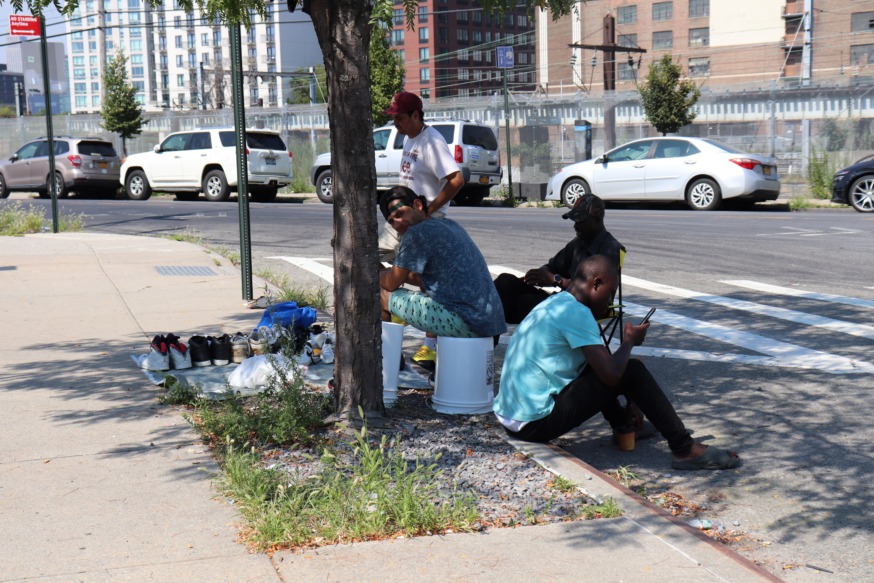
Economic Migrant shelter at 47-11 Austell Place in the Long Island City section of Queens (Photo by Michael Dorgan)
Sivi Benson, who works across from the shelter said she is concerned about her safety since the shelter opened, and questioned if the migrants have been properly vetted.
“I get off late at night and sometimes I am afraid of walking out in the dark by myself because there’s really no security out here. If you’ve been out here at night, you’ll see how dark it is. There’s no [street] light, so it is very dangerous out here,” Benson said. “So, I don’t understand why they don’t let us know and give us a chance to speak up on [it], if we want migrants here and no security.”
“I don’t care if they’re there and …. I don’t know the background of anybody so, I’m not saying they don’t belong here, but I don’t know anybody’s background,” she added.
The mayor’s office said that the migrants are vetted at the border before the city houses them. The Queens/LIC Post reached out to U.S. Immigration and Customs Enforcement (ICE) for information on the nature of the vetting process, but the agency did not provide the information prior to publication.
Benson pointed out that there is a police office across from the shelter and that makes her a little bit more comfortable, but said she disagrees with the city paying for migrants to be housed and fed on the tax-payers dime.
“I don’t think it’s right,” she said. “If they get free benefits, I want free benefits, too. We don’t even have space for our own New Yorkers, let alone migrants … They should have a limit for each state.”
The Long Island City Partnership (LICP), a local economic development organization, has also raised alarm about the facility and called on the federal movement to expedite work permits for the migrants.
“Long Island City has long served as a welcoming community to New York City’s newcomers,” Laura Rothrock, the president of the LICP said in a statement to the Queens/LIC Post.
“As a business association, we are concerned with an influx of a large population that is legally prohibited from joining the workforce, and agree with the mayor’s and the governor’s calls on the federal government to expedite work authorizations for asylum seekers, so they can support themselves and loved ones and help contribute to our local economy.”
Meanwhile, Anne Bodine, a former diplomat who worked for the State Dept., told the Queens/LIC Post that she feels the immigration system is broken.
“America benefits greatly from immigration and that’s what our country is founded on,” Bodiine said. “The system is broken because we have so many undocumented residents here and our economy depends on their addition to our labor force and I think we [should] have a conversation to admit how that works,” Bodine said.
She queried whether New York was the best place for the country to house migrants, given the high cost of living here.
“New York is a very big city. It has good transit and some under utilized space but not much, its very very expensive so that’s a question I’d have,” Bodine said. “I think for now it’s good to put them in these areas where you’ve identified some temporary hosting, it’s compassionate.”
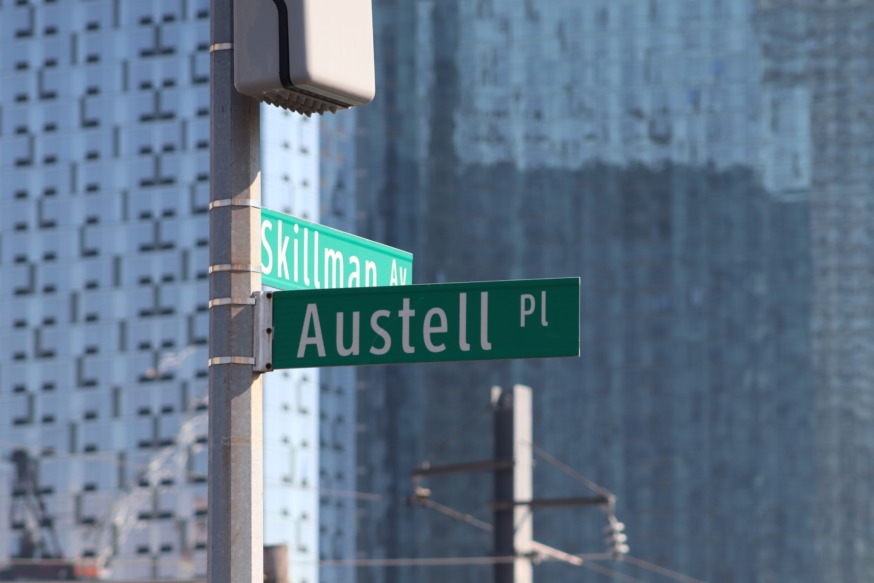
Economic Migrant shelter at 47-11 Austell Pl. in the Long Island City section of Queens (Photo by Michael Dorgan)

A police office building across from the shelter (Photo by Michael Dorgan)
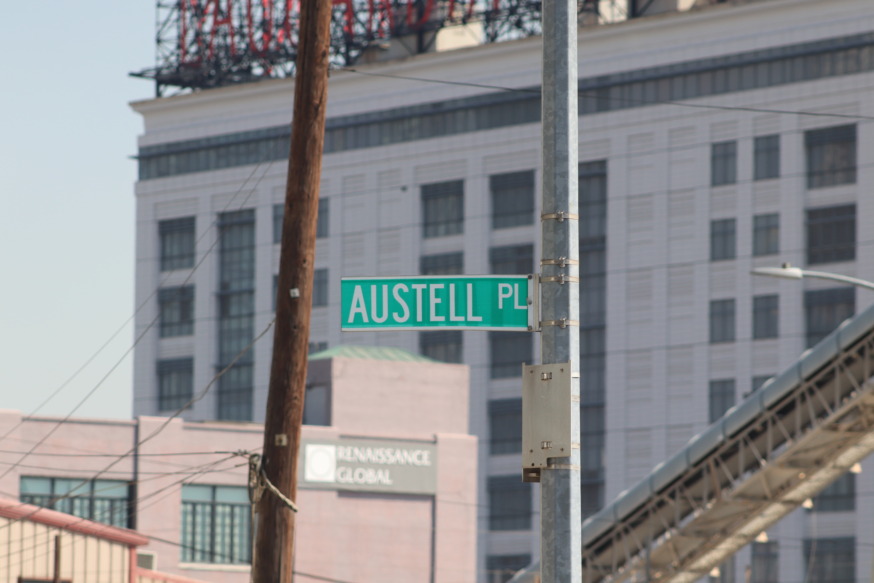
Economic Migrant shelter at 47-11 Austell Place in the Long Island City section of Queens (Photo by Michael Dorgan)

Economic Migrant shelter at 47-11 Austell Pl. in the Long Island City section of Queens (Photo by Michael Dorgan)
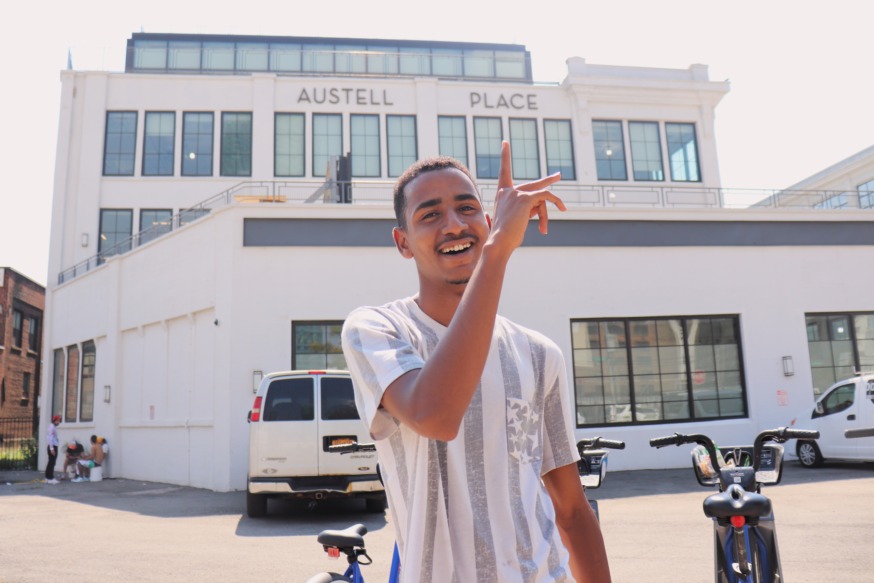
MIgrant Boubcrin el-Hakim outside the shelter (Photo by Michael Dorgan)
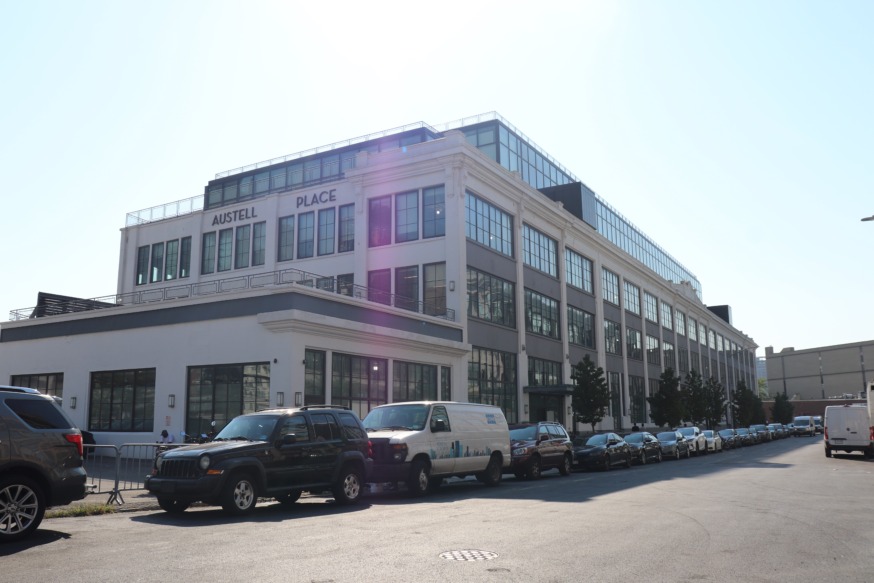
Economic Migrant shelter at 47-11 Austell Pl. in the Long Island City section of Queens (Photo by Michael Dorgan)
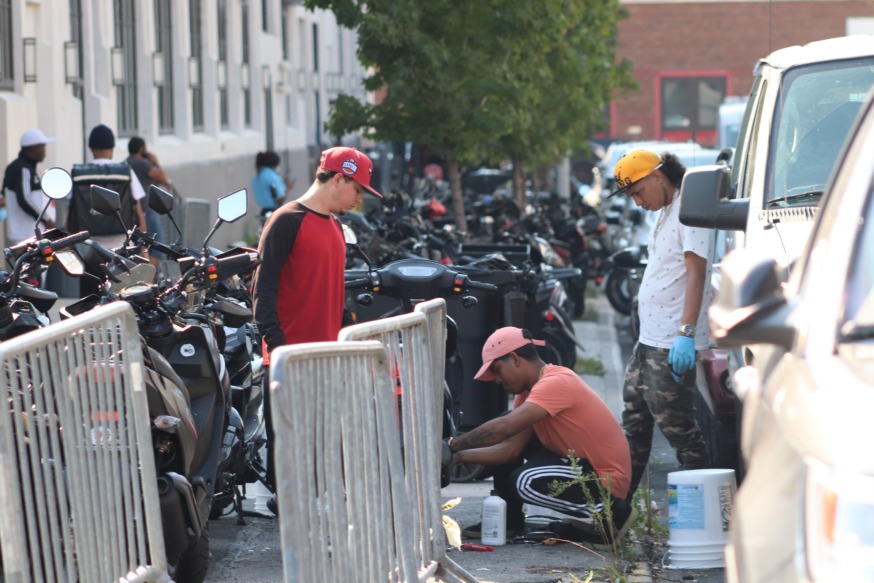
Men fixing moped outside the facility (Photo by Michael Dorgan)
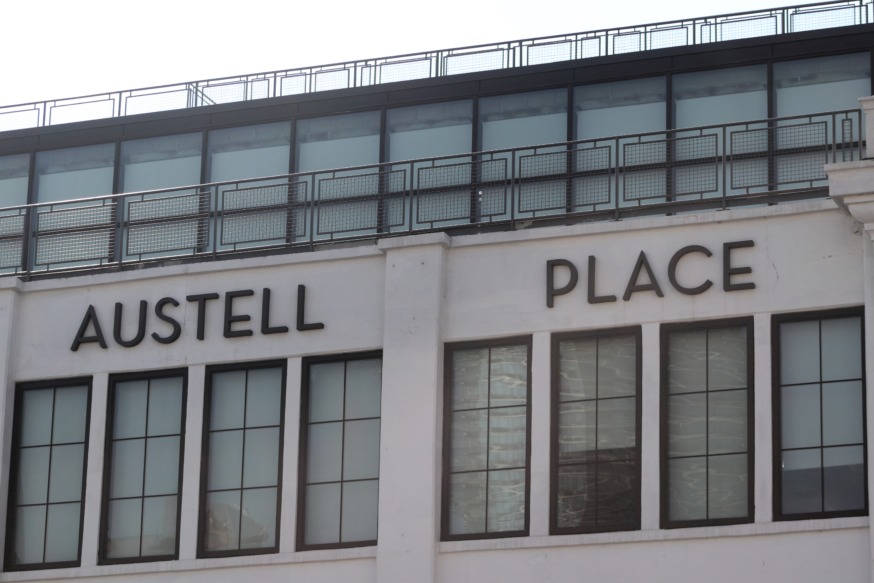
Economic Migrant shelter at 47-11 Austell Pl. in the Long Island City section of Queens (Photo by Michael Dorgan)
